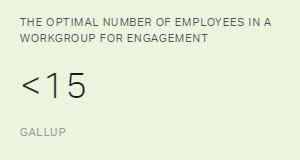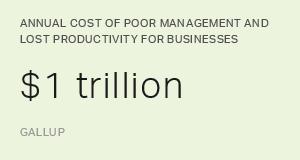Story Highlights
- Turnover costs health systems millions in onboarding and training
- Create a culture that strives to satisfy employees' basic needs
- Discover elements required by younger generations to truly thrive
In this two-part series, we examine how to keep your newer nursing staff from leaving after being trained and how to get them on board for the long haul. In the first article, we discussed how nurses can better connect with your organization's purpose. In this second part, we explore how to empower nurse managers to become coaches and how to maximize what your next-generation nursing employees do best every day.
Nurse turnover has reached record highs in the past few years -- and younger generations of nurses are especially prone to leave.
Lofty turnover costs health systems millions in onboarding and training expenses, not to mention the deleterious effects on workplace culture and quality of care.
To keep talented nurses, healthcare organizations must create a culture that relentlessly satisfies employees' basic needs. In particular, leaders should deliver the specific elements that younger generations value in a workplace culture:
- Purpose. Compensation matters, but younger workers are more motivated by mission and meaning than by dollars and cents.
- Development. Today's employees crave development -- and they expect their workplace to provide ongoing opportunities to learn and grow.
- Coaching. Modern workers don't want bosses. They want coaches -- managers who create authentic relationships and offer individualized development.
- Ongoing conversations. Annual performance reviews are outdated and unmotivating. Younger generations need consistent feedback that helps them hone their skills.
- Strengths. Managers who emphasize overcoming weaknesses won't inspire employees. On the other hand, employees approach their work with enthusiasm when their manager celebrates and cultivates their strengths.
Part 1 of this series discussed how a rich sense of purpose and meaningful development can help nurses picture a future with their organization.
Here are practical insights and advice to help healthcare leaders provide coaching, ongoing conversations and strengths-based work.
Empower nurse managers to become coaches.
Today's employees want a manager who genuinely cares -- a mentor who will help them succeed. New nurses are highly motivated to stay (and perform) when they perceive that they can trust and rely on their manager.
Policies and guidelines matter, but nurse managers can't serve as coaches if they prioritize processes over people. Claiming to care is not enough; nurse managers must actually have nurses' backs. They should be present, involved and available. They should take the initiative and offer assistance when nurses are overwhelmed with patient care.
Even two-minute interactions in the hallway can demonstrate that nurse managers genuinely care. The best nurse managers are skilled relationship builders who clarify expectations, celebrate successes and arrange resources to help nurses accomplish their work.
Large spans of control can preclude nurse managers from developing meaningful individual relationships with nurses. Gallup research shows that engagement levels drop steadily for healthcare teams with spans of control that exceed 15 direct reports. In such circumstances, leaders should consider assigning mentorship responsibilities to clinical coordinators -- front-line nurses who facilitate individualized development with a small group of other front-line nurses.
Claiming to care is not enough; nurse managers must actually have nurses' backs. They should be present, involved and available.
It's incumbent on healthcare leaders to help nurse managers and clinical coordinators excel as coaches. Leaders should offer ongoing manager development experiences that teach nurse managers how to cultivate employee performance and build authentic relationships.
Use coaching conversations to provide frequent feedback.
Gallup has found that only 26% of employees strongly agree that the feedback they receive helps them do better work.
Why? Traditional feedback is infrequent, isolated and focused on past mistakes that can't be fixed. Today's employees want to feel heard and understood. They want an open, honest, two-way dialogue with their manager that helps them improve.
Individualized coaching conversations meet this need -- and position new nurses to rapidly rise to excellence. Great nurse managers emphasize the future in ongoing coaching conversations, asking questions such as: How can we improve our chances of success next time? What strategies would help us exceed patient or family member expectations?
The frequency of coaching conversations is paramount; nurses thrive with immediate, constructive feedback. The best workplaces empower nurse managers with a practical framework for maintaining open lines of communication.
Ultimately, coaching conversations foster collaboration, promote outcomes and help nurses navigate challenges with confidence. For example, a quick-connect conversation between a nurse manager and a new ICU nurse might reveal that increased cross-department collaboration with surgical teams would streamline and clarify onboarding experiences.
Leaders should evaluate -- and potentially redefine -- nurse managers' roles and expectations to liberate them to prioritize individualized coaching over administrative tasks. Just as important, nurse managers need the tools and development to become skilled coaches.
Help new nurses find work based on their strengths.
Today's nurses want satisfying work that allows them to use their unique talents to make a difference. This is why strengths-based workplaces have lower turnover (6% to 16% lower for low-turnover organizations and 26% to 72% lower for high-turnover organizations, according to Gallup analytics).
Creating a strengths-based work culture is a big task that requires C-suite commitment and a holistic strategy. First, leaders need to require every new hire to discover their strengths. Through objective strengths measurement, workplaces create a common language that improves collaboration and performance.
Strengths discovery is just the beginning: Leaders also need to infuse strengths throughout all aspects of the employee experience -- from goal-setting to hiring practices to employee recognition.
Critically, nurse managers should integrate strengths into performance management. With a deep understanding of each nurse's strengths, world-class nurse managers can harmonize team strengths and assign tasks that best match a new hire's natural talents.
For example, a new nurse who possesses high levels of the Empathy theme might find it intuitive and rewarding to foresee patient perceptions and needs. A strengths-based nurse manager would consider how this individual might support teams dedicated to optimizing the patient experience.
Nurse managers should use frequent coaching conversations to discover the nuances of each individual's unique strengths -- and, in turn, have richer discussions that lead to competency development. The best nurse managers ask their nurses questions such as: What activities do you derive satisfaction from? What do you need from others to do your best work? What tasks come naturally to you? What are you working on when time seems to fly by?
Strengths-based management is a triple-win for healthcare organizations: Employees, patients and business outcomes benefit when employees can do what they do best every day.
Convincing talented nurses to stay is hard work. Simply knowing what the next generation of nurses wants in a job isn't enough to create change -- and neither is a one-and-done initiative. Improvement demands dedication from leaders who recognize the importance of investing in hospital staff.
The best nurse managers ask their nurses questions such as: What activities do you derive satisfaction from? What do you need from others to do your best work? What tasks come naturally to you? What are you working on when time seems to fly by?
In Gallup's experience, leaders who achieve enviably low turnover employ a holistic workplace strategy that spans the entire employee experience, from attraction to exit strategy.
These world-class leaders discover what talented nurses are looking for -- such as tuition reimbursement and a development-rich work environment -- to win the best job seekers. Then, they use unbiased, analytics-driven hiring methods to select perfect-fit candidates.
Further, they ensure that their onboarding journey promotes rich relationships and development -- rather than leaving new hires with unclear expectations or buyer's remorse.
The best leaders continually create exceptional employee experiences by following proven best practices for engaging and developing nurses. Because today's nurses want a coach, not a boss, great leaders reevaluate programs and procedures to promote frequent coaching conversations and individualized, strengths-based performance development.
A comprehensive strategy does far more than curb nurse turnover. When leaders deliver what talented nurses want, they bring out the best in every employee.
Partner with Gallup to build a strategy to retain nurses and achieve incredible outcomes for the patients and populations you serve:
- Download our report Designing Your Organization's Employee Experience.
- Better engage your employees through coaching, not managing. Learn about this online course.
- Cure modern healthcare starting with its people. Learn more about Gallup's healthcare solutions.




